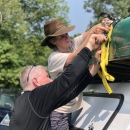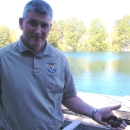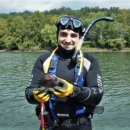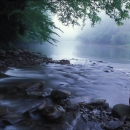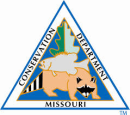Freshwater Mussel Conservation in Missouri
Freshwater mussels across the world, including Missouri, are increasingly threatened by habitat loss and degradation. Our agency actively collaborates with federal, state and non-governmental partners to study and protect these essential species. The full video series on freshwater mussel conservation in Missouri can be found on Youtube
Missouri's hidden heroes: freshwater mussels and river water quality
Native freshwater mussels provide many ecosystem services, like filtering sediment and toxins from water. Bryan Simmons (USFWS) and Josh Hundley (USFWS) explain how scientists often use mussels as bioindicators— to learn about the health of an ecosystem. Missouri's hidden heroes: freshwater mussels and river water quality: Audio described version.
Understanding freshwater mussels and how they age
Freshwater mussels, clams, oysters and snails are all related— they’re all mollusks, meaning they have a soft body protected by a shell! Scientists can learn a lot about a mussels shell including determining the species, sex and age. Leslie Lueckenhoff (USFWS) and Bryan Simmons (USFWS) show us how to age a mussel by counting the lines(similar to counting tree rings!) their shells. Understanding freshwater mussels and how they age: Audio described version.
Life below the surface: Missouri's mussel conservation efforts
There are more than 70 species of freshwater mussels in Missouri, some of which can live decades or even centuries! However, many species aren’t reproducing. Andy Roberts (USFWS) and Josh Hundley (USFWS) explain how limited host fish movements can reduce the ability for mussels to reproduce. Other threats affecting mussel reproduction include habitat modification and pollution. Life below the surface: Missouri's mussel conservation efforts: Audio described version.
Preserving Missouri's mussels: USFWS' commitment to freshwater mussel conservation
Mussels need a stable environment, a natural flow of good quality water and a host for their larvae. Bryan Simmons (USFWS) and Josh Hundley (USFWS) share their passion for freshwater mussel conservation and the importance of partnerships to protect and conserve mussels in Missouri. Preserving Missouri's mussels: USFWS' commitment to freshwater mussel conservation: Audio described version.
Take a dive with the USFWS: exploring mussel ecology in Missouri
Freshwater mussels can be long-lived and can live in large groups called mussel beds. Biologists monitor these mussel beds by snorkeling and scuba diving to determine the age of the mussels and how many species are present.. Leslie Lueckenhoff (USFWS) and Andry Roberts (USFWS) explain what information they look for and why it’s important to study freshwater mussels. Take a dive with the USFWS: exploring mussel ecology in Missouri: Audio described version.
U.S. Fish and Wildlife Service
- Gabriela Wolf-Gonzalez
- Leslie Lueckenhoff
- Bryan Simmons
- Josh Hundley
- Andy Roberts
- Brett Billings
- Ryan Hagerty
- Melissa Clark
- Melissa Gonzalez
U.S. Army Corps of Engineers
- Eric Limanen
- Eric Lemons
Accessibility
Section 508 of the Rehabilitation Act of 1973, as amended (29 U.S.C. 794d), and 375 DM 8 requires The U.S. Fish and Wildlife Service to ensure that any Information of Communication Technology it develops, procures, uses or maintains is accessible to both Federal employees and members of the public with disabilities. These videos are included in a general playlist which will include accessible videos with closed captions and audio descriptions.


